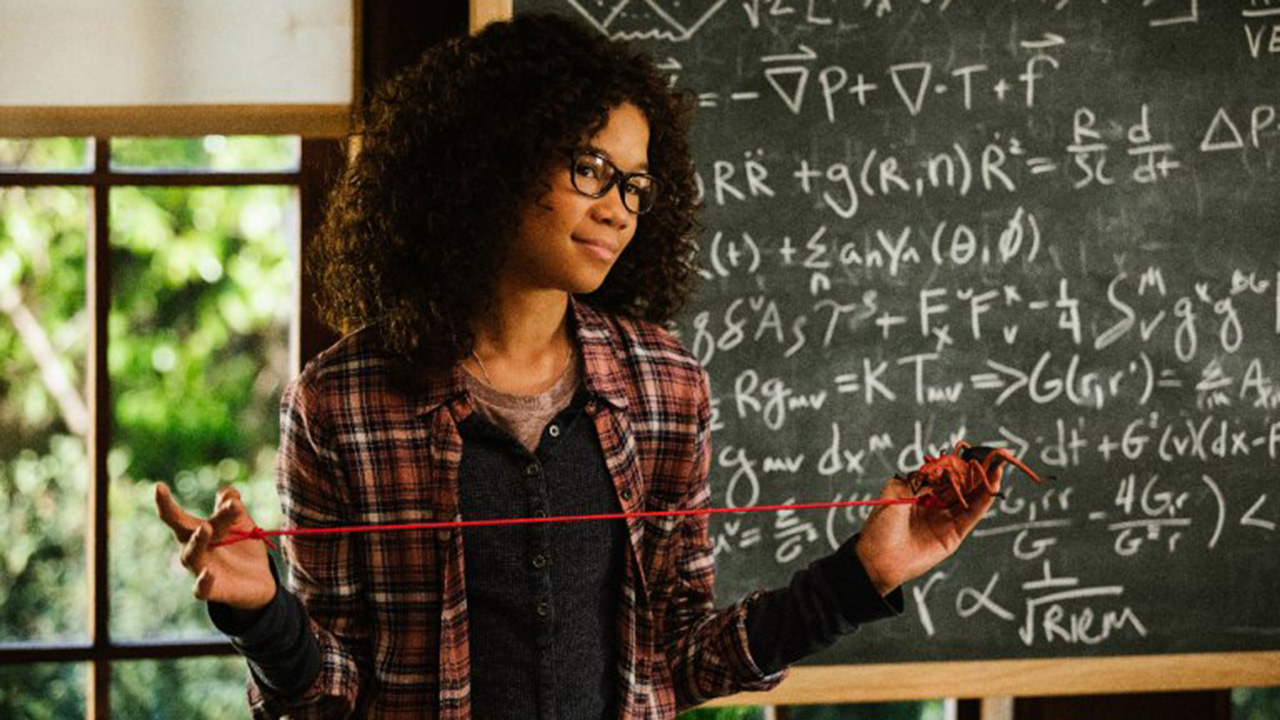Arriving to overblown fanfare and unreasonable expectations, Ava DuVernay‘s A Wrinkle In Time was never going to live up to the hype.
It was bad enough that box office watchers openly wondered how A Wrinkle In Time would compete with Black Panther, a money-printing machine of historic, multi-hyphenate proportions. A non-franchise adaptation of a beloved if wonky Christian children’s fantasy novel, one that intuitively seems better suited for a Netflix series than a 110-minute standalone, DuVernay’s picture was somehow tasked with proving that a) Black female directors can helm $100M+ tentpole spectacles, and b) that the audience exists to justify further studio spending on majority-minority casts in such films. (The internet being the internet, the film was also greeted by the usual anonymous gangs of sad little white men trying to tear it down in advance; that tesser is always on time.) Simply being an entertaining, visually stunning kid’s movie stamped by a personal vision was never going to be sufficient. A Wrinkle In Time had to change the world to justify its existence.
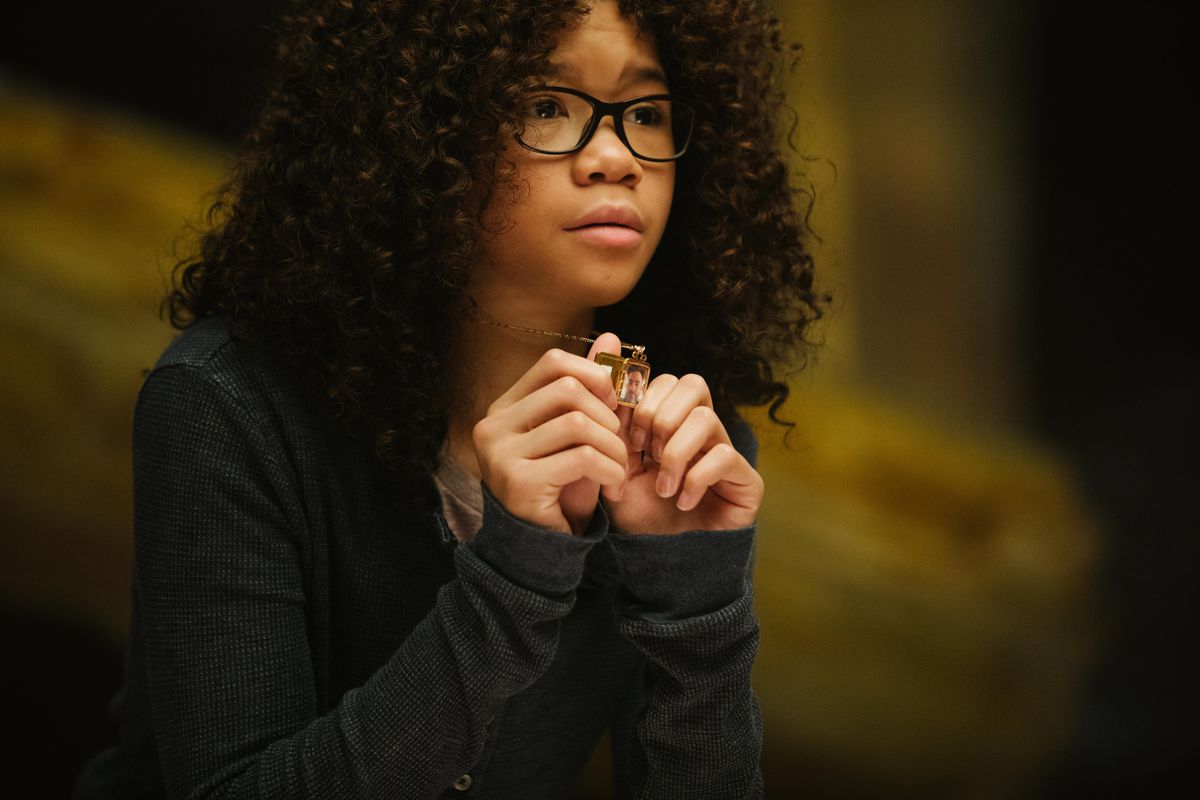 Well, it doesn’t and it won’t. Instead, A Wrinkle In Time and its team will have to settle for being an entertaining, visually-stunning kid’s movie stamped by a personal vision and aimed at youthful audiences who don’t often see themselves on screen.
Well, it doesn’t and it won’t. Instead, A Wrinkle In Time and its team will have to settle for being an entertaining, visually-stunning kid’s movie stamped by a personal vision and aimed at youthful audiences who don’t often see themselves on screen.
The plot, for those who never read or barely remember Madeline L’Engle’s classic, concerns our young protagonist Meg (Storm Reid, A Wrinkle In Time‘s breakout star and, with all due respect to Oprah, unquestionably its biggest asset). Introduced discovering the wonders of physics alongside her loving scientist dad (Chris Pine), Meg is an adorably precocious audience surrogate. In short order, she acquires an adopted little brother – the even more precocious, significantly more irritating Charles Wallace (Deric McCabe) – but loses her father, who vanishes without a trace while working on some high-level science stuff with the kids’ mom (a severely underused, under-developed Gugu Mbatha-Raw).
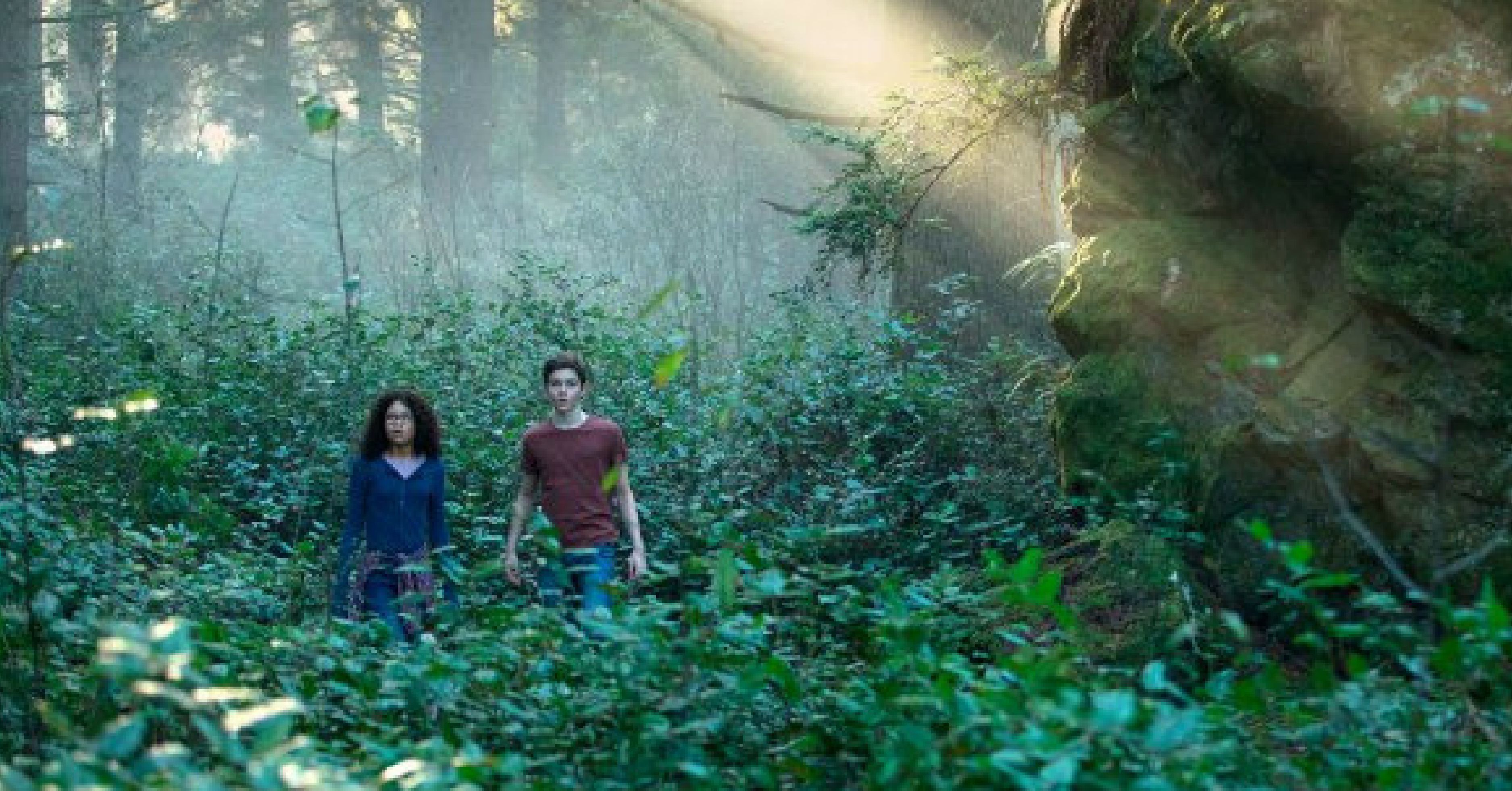 Dad’s tragic absence, and the quest to find him across space and time, drives the narrative. After a brief check-in regarding Meg’s struggles in school four years later, a hero’s journey is set in motion by the unexpected arrival of a strangely-clad woman named Mrs. Whatsit (Reese Witherspoon, striving mightily to sell clearly novelistic lines like “Wild nights are my glory!” as she runs out into the rain). Meg, Charles Wallace, and the extremely clingy love interest Calvin (Levi Miller), whose primary character attributes seem to be his moderately inappropriate infatuation with Meg’s hair and a general air of fanboy adoration, will meet the other two members of L’Engle’s Trinity – the ever-smiling Mrs. Who (Mindy Kaling) and the terrifyingly astrally-projected Mrs. Which (Oprah) – and A Wrinkle In Time is off.
Dad’s tragic absence, and the quest to find him across space and time, drives the narrative. After a brief check-in regarding Meg’s struggles in school four years later, a hero’s journey is set in motion by the unexpected arrival of a strangely-clad woman named Mrs. Whatsit (Reese Witherspoon, striving mightily to sell clearly novelistic lines like “Wild nights are my glory!” as she runs out into the rain). Meg, Charles Wallace, and the extremely clingy love interest Calvin (Levi Miller), whose primary character attributes seem to be his moderately inappropriate infatuation with Meg’s hair and a general air of fanboy adoration, will meet the other two members of L’Engle’s Trinity – the ever-smiling Mrs. Who (Mindy Kaling) and the terrifyingly astrally-projected Mrs. Which (Oprah) – and A Wrinkle In Time is off.
If this all seems abrupt, that’s because it is. DuVernay and screenwriters Jennifer Lee and Jeff Stockwell never really get a handle on the pacing; the intro seems too short, parts in the middle seem unexpectedly leisurely, and it all ends like a timer went off or the money ran out. (Perhaps Reese may had had to film a featurette for something.)
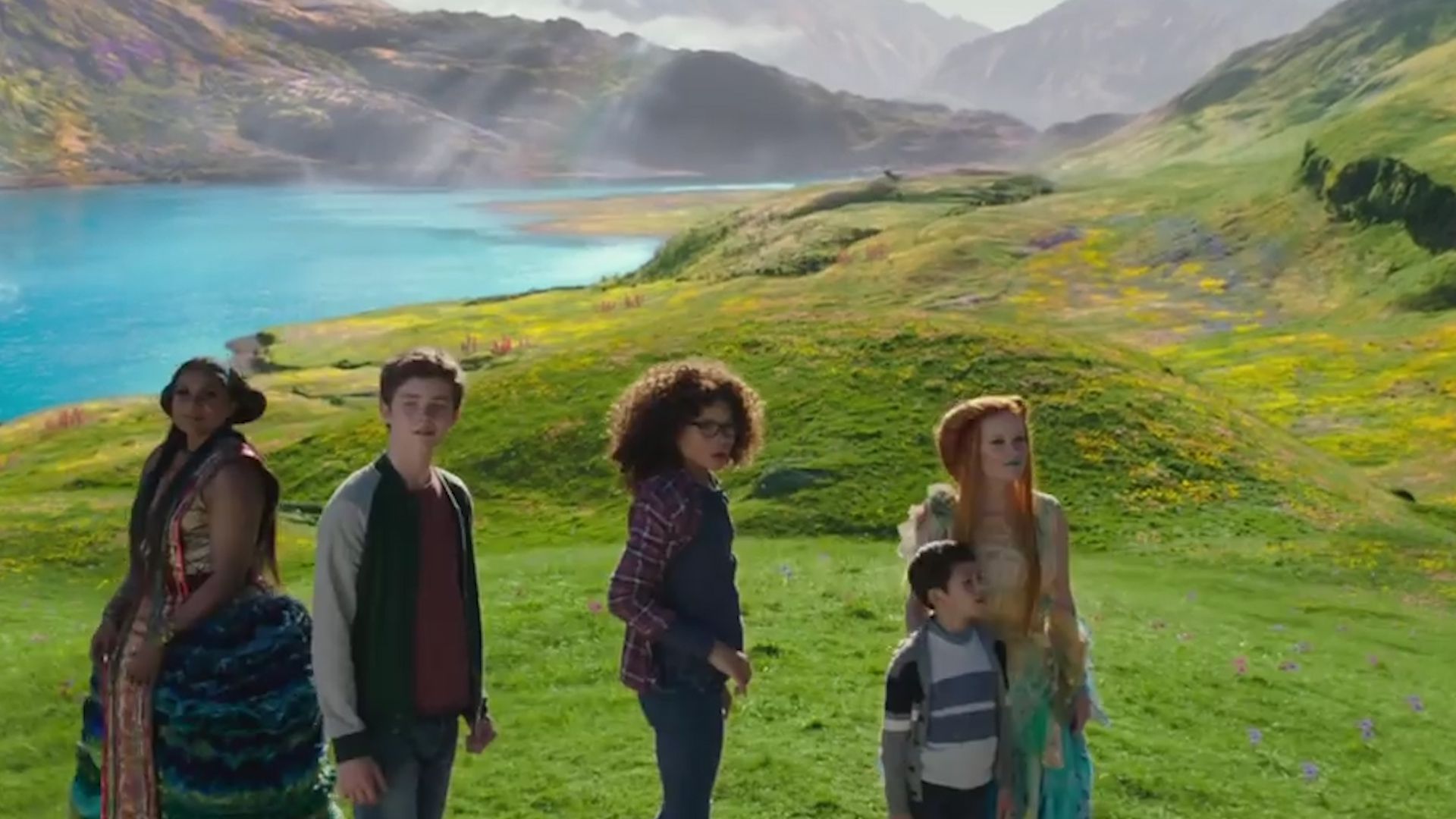 Still, amid the unsteady pacing, there are some glorious images. In order to find Dad, the trio is introduced to the tesseract, a space-time continuum, the title’s “wrinkle.” They fly across alien skies, interact with sentient flowers, hang out with a very funny Zach Galifianakis, and, eventually, encounter a force of pure malevolence known as The It (menacingly voiced by David Oyewolo). The effects team conjures up some striking visuals all along the way, and Meg’s woo-woo tour guides through the cosmos gently coax her into self-confidence and recognition of her unique value as an individual.
Still, amid the unsteady pacing, there are some glorious images. In order to find Dad, the trio is introduced to the tesseract, a space-time continuum, the title’s “wrinkle.” They fly across alien skies, interact with sentient flowers, hang out with a very funny Zach Galifianakis, and, eventually, encounter a force of pure malevolence known as The It (menacingly voiced by David Oyewolo). The effects team conjures up some striking visuals all along the way, and Meg’s woo-woo tour guides through the cosmos gently coax her into self-confidence and recognition of her unique value as an individual.
A Wrinkle In Time wears its heart so prominently on its sleeve that faulting it for that very aspect just seems unkind. There’s a particular moment of self-realization – you’ll know the one – that’s among the more powerful depictions of self-doubt, adolescent fear, and even biracial anxiety that I can remember in a recent kid’s movie. It’s raw stuff, standing out even more than it otherwise might amid all the outsized New Agery on display.
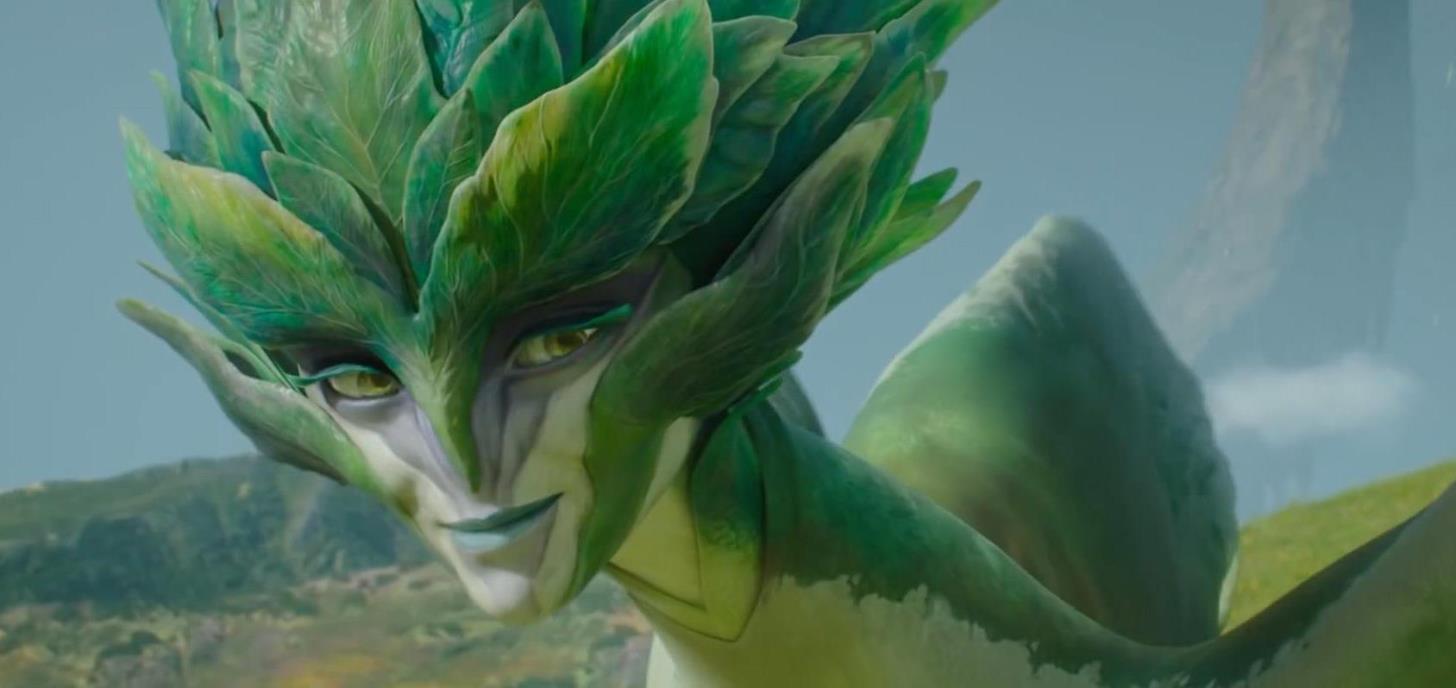 Is it weird that Witherspoon, Kaling, and Winfrey, the ostensible draws, make the least impact and are the least developed characters, apart from Mbatha-Raw? Functioning, as Scott Mendelson notes, as “the kind of ‘now you go here’ guides found in a video game,” they more or less arrive and depart at random, smiling knowingly through their makeup. They do provide a sense of wonder and magic, though it’s not too much to wish they’d been given more to do. (Or say. Kaling’s Mrs. Who, who speaks only in the words of others because she has “grown past language,” except for when she doesn’t, is especially contradictory and useless.) Oh well; it’s not their film anyway. Storm Reid’s Meg is the focus, as she ought to be, and she’s fantastic.
Is it weird that Witherspoon, Kaling, and Winfrey, the ostensible draws, make the least impact and are the least developed characters, apart from Mbatha-Raw? Functioning, as Scott Mendelson notes, as “the kind of ‘now you go here’ guides found in a video game,” they more or less arrive and depart at random, smiling knowingly through their makeup. They do provide a sense of wonder and magic, though it’s not too much to wish they’d been given more to do. (Or say. Kaling’s Mrs. Who, who speaks only in the words of others because she has “grown past language,” except for when she doesn’t, is especially contradictory and useless.) Oh well; it’s not their film anyway. Storm Reid’s Meg is the focus, as she ought to be, and she’s fantastic.
It still feels like A Wrinkle In Time is fated to be a victim of its expectations. And it’s not all a nefarious conspiracy. Some of these expectations can reasonably be laid on the producers and the marketing departments – did we really need an introductory featurette attesting to how hard everyone worked on the project, a form of pre-emptive apology I last encountered at a Regal Cinema trying to convince me to see Reese Witherspoon’s instantly forgotten Home Again? Or Armie Hammer inscrutably firing hot dogs from a hot-dog-shaped hot-dog cannon at a preview audience during the Oscars? Or Nissan creating custom Wrinkle In Time electric vehicles, like they did for that last little modest studio effort, Star Wars: The Last Jedi? – but, for the most part, they came from outside. To take a random example, when DuVernay told Vanity Fair that the story’s protagonist is “hopping planets and flying and saving the freakin’ world,” and Refinery 29 titled their same-day piece “Ava DuVernay Hopes That A Wrinkle In Time Will ‘Save The Freaking World’,” it’s hard to place that at DuVernay’s feet. This bizarre elision of creator and created seems reserved for her alone. It’s instructive to ask why. (I imagine DuVernay channeling Bob Dylan in Don’t Look Back: “Did you misquote Rian Johnson like that?”)
In the end, this seems like the sort of film that will find the audience that needs it. Uneven and charming in equal measure, it gets the job done. And the kids in the row behind me – you know, the intended audience – loved it. Outside the theater, one little girl declared, “That was great” to no one in particular. On some level, the rest is just a bunch of boring old people talking over her.

